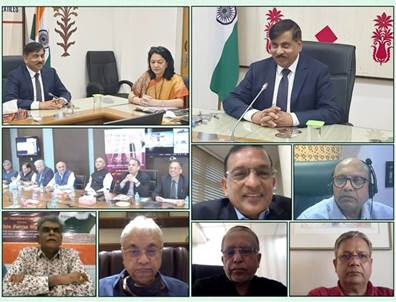Last Updated on October 12, 2022 3:11 am by INDIAN AWAAZ

By Aditya Raj Das / NEW DELHI
INDIA’S Apparel exports likely to breach $20 bn next fiscal or year after that Textile exports likely to cross $100 bn from current $40 bn in 5 years, said Upendra Prasad Singh, Secretary, Ministry of Textiles adding that the Indian apparel industry must focus on vertical integration to increase its scale and size and to benefit from the Production Linked Incentive (PLI) scheme.
Speaking at the 44th Foundation Day of Apparel Export Promotion Council (AEPC) today , Mr Singh said, “sapparel and garmenting is not very investment centric but it is very important from employment point of view. Perhaps, there is a need for backward integration and more of you can get into integrated value-chain like spinning and weaving.”
Virtually addressing the Foundation Day, the Textiles Secretary said that along with the PLI scheme, the government is committed to make the Prime Minister Mega Integrated Textile Region and Apparel (PM MITRA) scheme a success. Idea is not to just have a world class infrastructure but also a thriving industry there, he said.
Stating that textile has always been among the top priorities of the government, the Secretary said, “There are a lot of big opportunities. The demand continues to be robust and the China plus one sourcing strategy by the west is certainly a great opportunity for us.” Singh said that it all depended on how good, efficient and integrated the Indian apparel industry is and how it increases its size and scale. “AEPC has a big role to play. Let us not get into just the macro figure, let us get into the micro level. Let us go product by product and country by country,” he added.
“We should be in a position to breach $20 billion apparel exports by next fiscal or the year after that,” Singh said, adding that the country’s textile exports can increase from the current $40 billion to $100 billion in the next five years.
AEPC Chairman, Narendra Goenka shared the journey of the AEPC since its establishment in 1978 from a quota monitoring and export promotion body to the Council that today offers services ranging from skilling, assessment, market intelligence, advocacy, capacity building programs on financial risks, compliance management, IPR issues, AI and technology driven production innovations, lean and six sigma, circularity, sustainability, among others.
Goenka listed down the key priorities for the apparel sector namely leverage policy support for improving scales, product diversification, leverage the upcoming FTAs, create new USPs based on sustainability and responsible business, use technology and AI for leaner supply chain, and better branding. AEPC Vice Chairman Shri Sudhir Sekhri spoke about the initiatives taken by AEPC for the holistic growth of the apparel sector.
AEPC is the official body of apparel exporters in India, under the aegis of Ministry of Textiles, which provides invaluable assistance to Indian exporters as well as importers/ international buyers.
